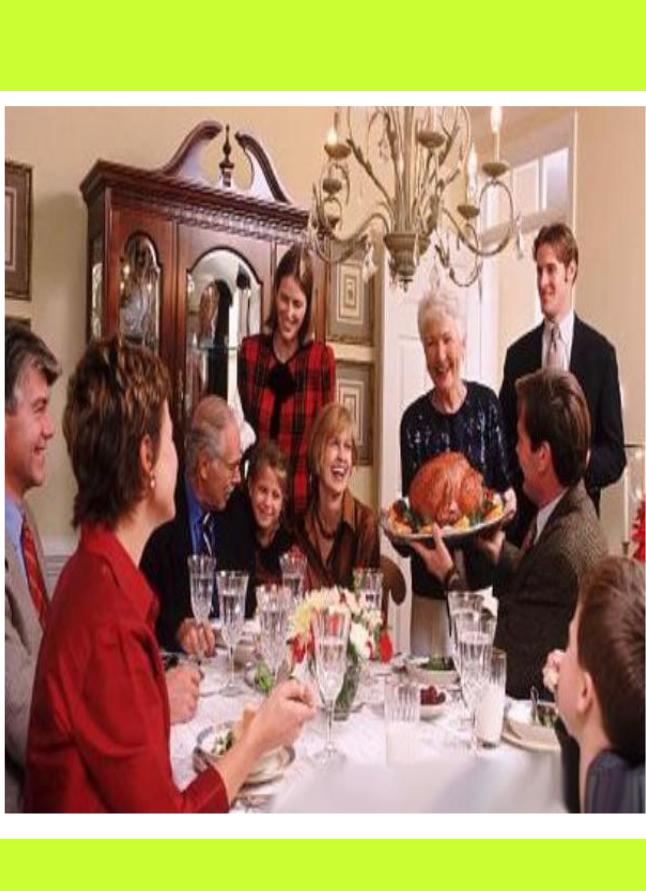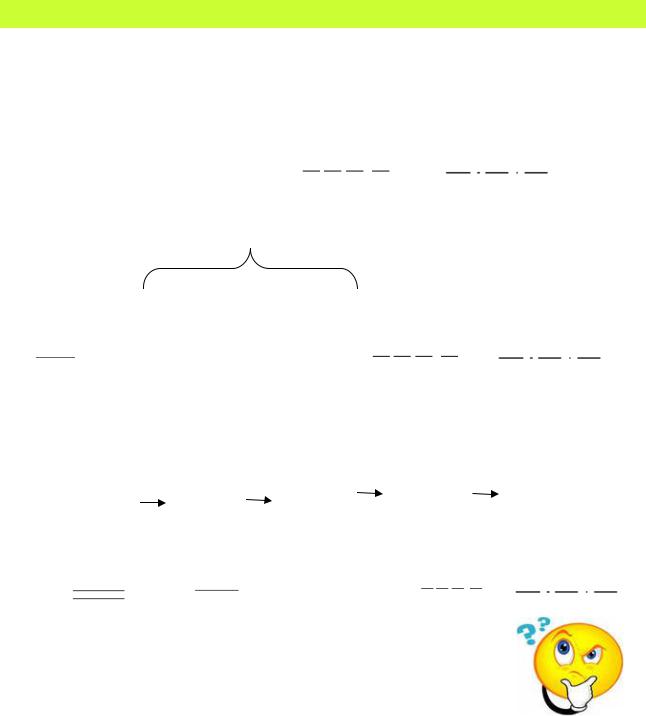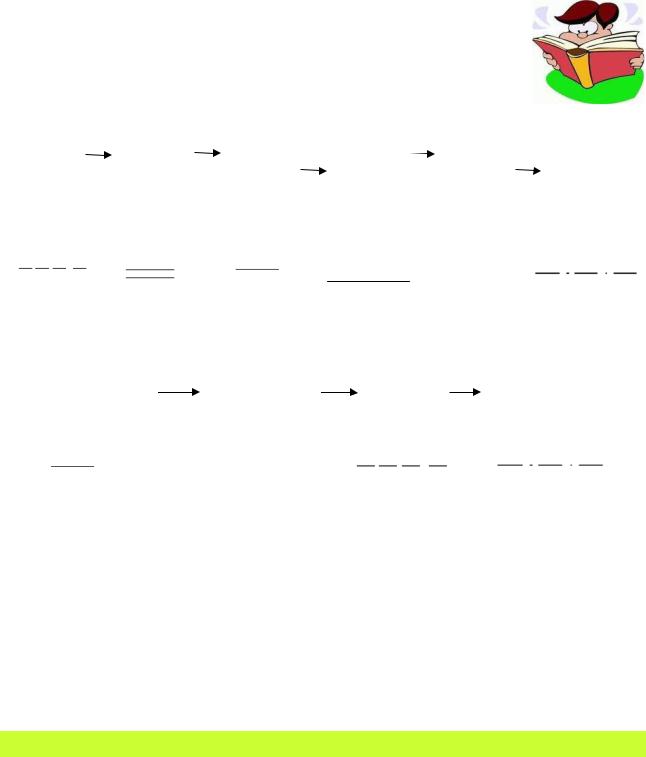
Kremneva-upnat
.pdf
UNIT 9
DINNER DISASTER
131

I. LISTENING AND READING
 Listen to the text
Listen to the text
Read and translate the text
DINNER DISASTER
Mr. and Mrs. Smith both loved cooking. Mr. Smith also wanted a better job in his company. They decided it was time for a dinner party. Mr. Smith phoned his new boss Mr. Plummer and invited him and his wife to dinner on Friday night.
On Friday afternoon, Mr. and Mrs. Smith spent a long time cooking a delicious dinner. They prepared fresh salmon, filled with prawns and chilli. They laid the table with silver candles and bottles of wine.
Then, they got ready. Mrs. Smith put on a black evening dress and Mr. Smith wore his best suit. Everything was perfect.
The Plummers arrived on time at eight o'clock. "Let's have a drink!" said Mr. Smith. They all went into the dining room. Then they saw the table and they were horrified. The main plate was empty. The salmon had gone!
Mrs. Smith burst into tears. "Don't worry, love! We can still have fish!" and Mr. Smith rushed out of the house.
He ran to the Fish and Chip shop down the road and bought four portions of fish and chips. The great British takeaway! And they all had a lovely evening. So did their pet cat ... 
|
II. NOTES |
|
|
|
|
|
|
|
Mr. and Mrs. Smith [smɪθ] |
Мистер и миссис Смит |
|
|
Mr. Plummer ['plʌmə] |
Мистер Пламер |
|
|
|
|
|
|
III. VOCABULARY |
|
|
|
1. both [bəuθ] |
оба |
|
|
I met Mr and Mrs Smith at a party and I Я познакомился с М-ром и Миссис |
|
|
|
liked both. |
Смит на вечеринке, и они мне оба |
|
|
2. cooking ['kukɪŋ] |
понравились. |
|
|
приготовление пищи |
|
|
|
My sister loves cooking. |
Моя сестра обожает готовить. |
|
|
3. job [ʤɔb] |
работа |
|
|
She has a job as a restaurant manager. |
Она работает менеджером в |
|
|
4. dinner party ['dɪnə 'pɑːtɪ] |
ресторане. |
|
|
званый ужин |
|
|
5. to phone [fəun]
Phone me if you have any questions.
6. to invite [ɪn'vaɪt]
How many people did you invite to your birthday party?
7.delicious[dɪ'lɪʃəs] The fruit tasted delicious.
8.to prepare [prɪ'pɛə]
The meal took two hours to prepare.
9.fresh salmon [freʃ 'sæmən]
10.to fill [fɪl]
Let me fill your glass.
food that fills
11. prawn [prɔːn]
They always order grilled prawns when they come to this restaurant.
12. to lay the table (lay-laid-laid) [leɪ ðiː 'teɪbl]
звонить Позвоните мне, если у Вас будут
какие-либо вопросы. пригласить
Сколько человек ты пригласил на свой день рождения?
восхитительный Фрукты были восхитительными на вкус.
приготовить Приготовление пищи заняло два часа.
свежий лосось
фаршировать, наполнять Позвольте мне наполнить Ваш стакан.
сытная пища
креветка.
Они всегда заказывают креветкигриль, когда приходят в этот ресторан.
накрыть на стол
133

13.silver candles [ˈsɪlvə ˈkændl]
14.wine [waɪn]
I'll have some red wine.
15.to get ready [ɡet ˈredɪ]
16.to put on [put ɔn]
17.perfect [ˈpɜːfɪkt]
His English was perfect.
18. to arrive [əˈraɪv] at/in
Her parents arrived inAmerica in 1926.
19.on time [ɔn taɪm] The train was on time.
20.to be horrified [ˈhɔrɪfaɪ]
21.main plate [meɪn pleɪt]
22.empty [ˈemptɪ]
The house seemed empty.
23.to burst into tears [bə:st ˈɪntu tɛəz]
24.still [stɪl]
We were still cleaning the house when the guests started to arrive.
25. to rush [rʌʃ]
A crowd [kraud] of people rushed for the bus.
26. portion [ˈpɔ:ʃən]
We're spending a large portion of our income on entertainment.
27.takeaway [ˈteɪkəˌweɪ] Let's get a takeaway.
28.lovely [ˈlʌvlɪ]
They had a lovely evening.
свечи в серебряных подсвечниках
вино Я выпью красного вина.
готовиться
одевать
идеальный Он безупречно говорил поанглийски.
приехать, прибыть в Ее родители прибыли в Америку в
1926.
вовремя Поезд прибыл вовремя.
быть в ужасе
основное блюдо пустой Дом казался нежилым.
разрыдаться все еще
Мы все еще наводили порядок в доме, когда гости начали прибывать.
помчаться Толпа людей устремились к автобусу.
порция, часть Мы тратим большую часть нашего
дохода на развлечения.
еда на вынос Давайте возьмем еду на вынос.
прекрасный, замечательный Они замечательно провели вечер.
IV. COMPREHENSION CHECK
1. ANSWER THE QUESTIONS:
134

1.What did Mr. and Mrs. Smith love doing?
2.What kind of job did Mr. Smith want in his company?
3.Whom did he call?
4.Why did he call Mr. Plummer?
5.What did Mr. and Mrs. Smith do on Friday afternoon?
6.What did they prepare?
7.What did they lay the table with?
8.What dress did Mrs. Smith put on?
9.What suit did Mr. Smith wear?
10.What room did they go to after the Plummers arrived?
11.What did they see?
12.How did they feel?
13.How did Mrs. Smith react?
14.What did Mr. Smith do? Where did he run?
15.What did he buy in the Fish and Chip shop?
16.What kind of evening did they all have?
17.What kind of evening did the Smiths’pet cat have?
V. GRAMMAR: THE PAST SIMPLE TENSE (ПРОСТОЕ ПРОШЕДШЕЕ ВРЕМЯ)
1. УПОТРЕБЛЕНИЕ PAST SIMPLE
PAST SIMPLE УПОТРЕБЛЯЕТСЯ ДЛЯ ОБОЗНАЧЕНИЯ:
1. Регулярных, повторяющихся действий в прошлом
My parents took me to the seaside every summer when I was little.
Мои родители возили меня на море каждое лето, когда я была маленькой.
2. однократных действий в прошлом
Маркерами Past Simple являются:
a)обстоятельства времени с … ago – 2 days ago, 5 months ago, a century ago.
135

b)обстоятельства времени с … last – last weak, last month, last year, last summer.
c)обстоятельства времени с указанием на тот год, когда произошло действие – in 2005.
Tom married Ann 5 years ago.
Том женился на Энн 5 лет назад.
3. действий в прошлом, следовавших одно за другим
She got up, went up to the window and looked out.
Она встала, подошла к окну и выглянула из него.
4. действий в прошлом в специальных вопросах, начинающихся с
“when”
When did you buy this dress?
Когда ты купила это платье?
136

2. ОБРАЗОВАНИЕ PAST SIMPLE
Все глаголы английского языка делятся на правильные и неправильные. Past Simple правильных глаголов в утвердительных предложениях образуется путем прибавления к ним окончания –ed.
Окончание –ed читается как:
[d] |
[t] |
[id] |
если глагол |
если глагол |
если глагол |
оканчивается на |
оканчивается на глухой |
оканчивается на звук |
гласный или звонкий |
согласный звук |
[t] или [d] |
согласный звук |
|
|
play – played |
work – worked |
decide – decided |
open - opened |
wash - washed |
translate - translated |
Для образования Past Simple в отрицательных и вопросительных предложениях используется вспомогательный глагол did.
число / лицо |
Утвердительная |
Отрицательная |
Вопросительная |
||
|
|
форма |
форма |
форма |
|
1 |
л. ед. ч. |
I worked |
I did not work |
Did I work? |
|
2 |
л. ед. ч. |
You worked |
You did not work |
Did you work? |
|
3л. ед. ч. |
He worked |
He did not work |
Did he work? |
||
|
|
She worked |
She did not work |
Did she work? |
|
1 |
л. мн. ч. |
It worked |
It did not work |
Did it work? |
|
We worked |
We did not work |
Did we work? |
|||
2 |
л. мн. ч. |
||||
You worked |
You did not work |
Did you work? |
|||
3 |
л. мн. ч. |
||||
They worked |
They did not work |
Did they work? |
|||
|
|
||||
Past Simple неправильных глаголов необходимо выучить:
Infinitive |
Past Indefinite |
|
Participle II |
Перевод |
|
|
|
|
|
to be [biː] |
was[wɔz], were [wɜː] |
|
been [biːn] |
быть |
to become [bɪ'kʌm] |
became [bɪ'keɪm] |
|
become [bɪ'kʌm] |
становиться |
to begin [bɪ'gɪn] |
began [bɪ'gæn] |
|
begun [bɪ'gʌn] |
начинать(ся) |
to break [breɪk] |
broke [brəuk] |
|
broken ['brəukn] |
ломать |
to bring [brɪŋ] |
brought [brɔːt] |
|
brought [brɔːt] |
приносить |
to build [bɪld] |
built [bɪlt] |
|
built [bɪlt] |
строить |
|
|
137 |
|
|
to buy [baɪ] |
bought [bɔːt] |
bought [bɔːt] |
покупать |
to choose [ʧuːz] |
chose [ʧəuz] |
chosen ['ʧəuzn] |
выбирать |
to come [kʌm] |
came [keɪm] |
come [kʌm] |
приходить |
to cost [kɔst] |
cost [kɔst] |
cost [kɔst] |
стоить |
to do [duː] |
did [dɪd] |
done [dʌn] |
делать |
to drink [drɪŋk] |
drank [dræŋk] |
drunk [drʌŋk] |
пить |
to drive [draɪv] |
drove [drəuv] |
driven ['drɪvn] |
везти |
to eat [iːt] |
ate [et] |
eaten ['iːtn] |
есть, кушать |
to fall [fɔːl] |
fell [fel] |
fallen ['fɔːlən] |
падать |
to feel [fiːl] |
felt [felt] |
felt [felt] |
чувствовать (себя) |
to find [faɪnd] |
found [faund] |
found [faund] |
находить |
to fly [flaɪ] |
flew [fluː] |
flown [fləun] |
летать |
to forget [fə'get] |
forgot [fə'gɔt] |
forgotten [fə'gɔtən] |
забывать |
to get [get] |
got [gɔt] |
got [gɔt] |
получать; |
to give [gɪv] |
gave [geɪv] |
given [gɪvən] |
давать |
to go [gəu] |
went [went] |
gone [gɔn] |
идти; ехать |
to have [həv] |
had [hæd] |
had [hæd] |
иметь |
to hear [hɪə] |
heard [hɜːd] |
heard [hɜːd] |
слышать |
to know [nəu] |
knew [njuː] |
known [nəun] |
знать |
to learn [lɜːn] |
learnt [lɜːnt] |
learnt [lɜːnt] |
учиться; узнавать |
to leave [liːv] |
left [left] |
left [left] |
покидать, оставлять |
to lose [luːz] |
lost [lɔst] |
lost [lɔst] |
терять |
to make [meɪk] |
made [meɪd] |
made [meɪd] |
делать, создавать |
to meet [miːt] |
met [met] |
met [met] |
встречать(ся) |
to put [put] |
put [put] |
put [put] |
класть, ставить |
to read [riːd] |
read [red] |
read [red] |
читать |
to run [rʌn] |
ran [ræn] |
run [rʌn] |
бежать |
to say [seɪ] |
said [sed] |
said [sed] |
сказать; говорить |
to see [siː] |
saw [sɔː] |
seen [siːn] |
видеть |
to sell [sel] |
sold [səuld] |
sold [səuld] |
продавать |
to send [send] |
sent [sent] |
sent [sent] |
посылать, отправлять |
to show [ʃəu] |
showed [ʃəud] |
shown [ʃəun] |
показывать |
to sit [sɪt] |
sat [sæt] |
sat [sat] |
сидеть |
to sleep [sliːp] |
slept [slept] |
slept [slept] |
спать |
to speak [spiːk] |
spoke [spəuk] |
spoken ['spəukn] |
говорить, |
|
|
|
разговаривать |
to spend [spend] |
spent [spent] |
spent [spent] |
тратить; проводить |
|
|
|
(время) |
to swim [swɪm] |
swam [swæm] |
swum [swʌm] |
плавать |
to take [teɪk] |
took [tuk] |
taken ['teɪkn] |
брать, взять |
to teach [tiːʧ] |
taught [tɔːt] |
taught [tɔːt] |
учить, обучать |
to tell [tel] |
told [təuld] |
told [təuld] |
сказать, рассказывать |
to think [θɪŋk] |
thought [θɔːt] |
thought [θɔːt] |
думать |
to understand |
understood [ˌʌndə'stud] |
understood |
понимать |
[ˌʌndə'stænd] |
|
[ˌʌndə'stud] |
|
to write [raɪt] |
wrote [raɪt] |
written ['rɪt(ə)n] |
писать |
|
138 |
|
|

3. СТРУКТУРА ПРЕДЛОЖЕНИЙ В PAST SIMPLE
CТРУКТУРА ПОВЕСТВОВАТЕЛЬНОГО ПРЕДЛОЖЕНИЯ
П Ск
Ск  Доп
Доп  Об-во
Об-во
He |
|
translated |
the book |
last year. |
|
wrote |
|||
|
|
|
|
|
|
|
|
|
|
СТРУКТУРА ОТРИЦАТЕЛЬНОГО ПРЕДЛОЖЕНИЯ
П  Ск
Ск  Доп
Доп  Об-во
Об-во
всп.гл. not
not  смысл. гл.
смысл. гл.
He |
did not translate |
the book |
last year. |
|
did not write |
||||
|
|
|
||
|
|
|
|
|
|
|
|
|
СТРУКТУРА ВОПРОСИТЕЛЬНОГО ПРЕДЛОЖЕНИЯ
|
|
Общий вопрос |
|
|
||
Всп. |
П |
Ост/ч |
Доп |
Об-во |
||
гл. |
|
|
Ск |
|
|
|
Did |
he |
translate |
the book |
last year? |
||
|
|
|
write |
|
|
|
|
|
|
|
|
|
|
Make the sentences negative and interrogative.
1. Mr Black fixed his car yesterday morning 2. His wife watered plants in the garden. 3. Their children cleaned the yard. 4. In the evening they are watched TV. 5. The little girl cried and then
smiled. 6. Mrs Black worked in the kitchen. 7. She baked a delicious apple pie. 8. She cooked tomato soup. 9. After dinner she washed the dishes. 10. The children brushed their teeth. 11. Mrs Black talked on the phone. 12. Mr. Black smoked a cigarette. 13. They visited their friends two days ago. 14. They danced a lot there. 15. They had a wonderful time with their friends.
139

СТРУКТУРА СПЕЦИАЛЬНОГО ВОПРОСА
Специальный вопрос
Вопр. |
Всп. |
П |
|
Ост/ч |
Доп |
Об-во |
|
сл. |
гл. |
|
Ск |
||||
What |
did |
he |
translate |
– |
last year? |
||
|
|
|
|
write |
|
|
|
|
|
|
|
|
|
|
|
Вопрос к подлежащему
Вопр.сл. |
|
Ск |
Доп |
Об-во |
|
Who |
translated |
books |
last year? |
||
|
wrote |
||||
|
|
|
|
||
|
|
|
|
|
|
Put special questions to the italicized words.
1. She studied English two years ago (3). 2. Last night he washed his face with soap and water (3). 3. Yesterday Tom walked to his office (2). 4. He called his Dad a minute ago (2). 5. Mary liked ice-cream when she was little (1). 6. We enjoyed swimming in the ocean last weekend (2). 7. Frances lived in this house from 2000 to 2004 (3). 8. They stayed at the Flamingo hotel that summer (3). 9. Linda visited the
British Museum the day before yesterday (3). 10. Tom turned on the TV to watch cartoons yesterday morning (2). 11. Kate cooked dinner two hours ago (1). 12. Tanya worked hard at her English (2). 13. They listened to classical music at the concert (3). 14. The Browns decided to spend the holidays in the country (1).
VI. EXERCISES
1. Read the verbs in the Past Simple observing the rule of reading –ed.
packed, translated, watched, clapped, divided, ruled, brushed, cleaned, worked, banned, fixed, decided, finished, worked, cried, shouted, changed, voted, smoked, danced, decided, cooked, completed, managed, enjoyed, listened, waited, baked, rented, dropped, visited, opened, planted, boxed, phoned, played, smiled, watered, prepaired, combed, explained, provided, talked, stayed, started, fried, washed, peeled
140
